Capt. W.E. Price, M.P. (1841-1886)
A Corrupt M.P.?
uniform (D. Parker)[10]Click Image
to Expand
Whatever its reduced political status since 1974, it is still awe-inspiring to be able to sit in the Council Chamber of Tewkesbury’s Town Hall. Looking around at the portraits adorning the walls, one is burdened by a sense of history and the doubt whether one can aspire to emulate these august figures.
One of the most impressive portraits is that of the avuncular figure of Thomas Collins who had worked his way up to be the major employer in Tewkesbury, a builder of regional repute, a benefactor to the town and Mayor five times between 1890 and 1896. To add greater dignity, around his neck is hung the Civic Regalia of the Borough which is worn by the Mayor to this day.
That badge of office had been presented in 1879 to the Mayor and Town Council by its current M.P. Captain W.E. Price. This was part of a long established tradition whereby, in return for his election, an M.P. was expected to make a significant gift to the Corporation. In this way, the beautiful gates which still adorn the Abbey were presented by the then M.P. Lord Gage. To modern susceptibilities, this may smack of corruption and, indeed, Captain Price has been labelled a corrupt M.P. who lost his seat because of election irregularities. He was, as David Willavoys reminded us, prosecuted by none other than Thomas Collins who later wore that medallion with such pride.[2]
The election of the Liberal M.P., however, should have been the start of an exciting new era of greater democracy.
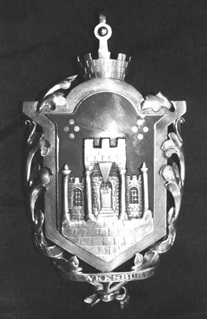
Captain Price was the first M.P. to be elected by the new electorate of Tewkesbury since, in 1867, Parliament had widened the franchise to include the urban skilled working class male. This election also represented the demise of the old aristocratic Tory/Whig duopoly and its replacement by Gladstone’s Liberal Government. In this contest, Liberal Price defeated Conservative banker and landowner Lechmere[4] by 74 votes. In 1874, his majority was increased to a very comfortable 734. He won again in 1880, but was immediately unseated after he was convicted of bribery and corruption.[5] Was he innately corrupt or was he the victim of a rise in ethical standards which left him stranded in “one of the few old towns with bad habits”?[6]
He certainly does not seem to have been regarded by contemporaries as innately corrupt since his premature death seemed to elicit sympathy and his life was included in Joseph Stratford, Gloucestershire Biographical Notes, written in 1887.[7]
His ties with Tewkesbury were, however, more tenuous even than those of his aristocratic predecessors. He belonged to Gloucester plutocracy, being the grandson of William Price prosperous merchant of Gloucester and founder and director of Gloucestershire Banking Co., who died in 1838 aged 50.
However, the connections of this bank with Tewkesbury were very real. One of the earliest managers was Edward Gould Edgell who died in 1843 and who was succeeded by his son, Edward Higginson Edgell. By the 1850s the bank had merged with Hartland Bank, named after the Quaker philanthropist, Nathaniel Hartland. However, we have already encountered the bank in its less happy association with the disgraced M.P., Humphrey Brown, who was imprisoned after his involvement in a banking fraud.[8] In 1885 the bank was bought by the Capital and Counties Bank which subsequently became Lloyd’s Bank, who closed the Church Street branch in 1921 when it redeveloped its flagship in its present position in the High Street.[9]
Gloucestershire Bank, in 2021Click Image
to Expand
William Edwin Price, M.P. for Tewkesbury from 1868-1880, was born in 1841 the only son of William Philip Price who then lived in the splendour of Tibberton Court, very near to Highnam, which still resides in the modern Borough of Tewkesbury despite its being south west of Gloucester. Benefiting from a traditional aristocratic education at Eton, he then went on to study at University College, London, which was one of the most enlightened of the London Colleges. Founded in 1826, entrance did not depend on any religious affiliations. One of its founders was Jeremy Bentham, the philosopher of Utilitarianism which was to become very influential in Victorian England.[11] William Edwin Price did seem to follow the aristocratic tradition of obtaining a commission in the Army but he proved that he was, perhaps, a man ahead of his times in that he entered Woolwich Academy as a result of a competitive exam. This aspect of what today we would term ‘meritocracy’ was very much favoured by the Liberal Party and Government of which he was a representative. Gladstone’s government swept away religious tests as a qualification and abolished the purchase of commissions in the British armed forces. However, although Woolwich was the training school often for Artillery Officers, Price’s military career did not seem to blossom as he served for a time in the Light Infantry before retiring to a captaincy in command of the Gloucester City Rifle Company, a precursor of the modern Territorial Army. He seemed to be reverting to type and settling for an aristocratic lifestyle.
He did not marry until ten years after his election, on 29 July 1878: he chose Margaret Phillips, the daughter of the M.P. for Bury, and actually settled at Hillfield, Wotton Pitch in Gloucester.[12] It may be significant that he had maintained Tibberton Harriers at his own expense, but he sold out in 1878. It was not until 1885 that a son was born.[13]
to Expand
As M.P. he did not merit an excessive number of mentions in the index of the Tewkesbury Register. In fact his own agent, solicitor F.J. Brown, had chided him in 1879: “Are you not somewhat lazy as an M.P.? I hear that you are going to visit the Danube when the Severn ought to be as much interest to you”.[14] However, he sensibly involved himself to some extent inevitably with the Volunteer Rifle Corps[15] as well as the Regatta.[16] He also supported local charities since in 1871 he “gave 100 tons coal to Relief Committee for families of working men who have lost jobs due to severe frost”.[17] His last recorded gesture was in 1879 with the donation of a Gold Chain of Mayoral Office to the Town and its presentation to Mr. Prosser when he was elected for the fifth time.[18]
Wendy also has emphasised that his Conservative opponent had a formidable pedigree. John Fowler, 1817–98, was certainly not local. A Scot, he co-designed and built the Forth Bridge (1882–90) in Scotland, the first major structure made of steel. He also designed much of the London Metropolitan Railway, forerunner of the underground railways, and later served as an engineer in the development of the London subway system. In 1865 he was elected President of the Institution of Civil Engineers, the youngest president who had ever sat in the chair. For eight years from 1871 he acted as general engineering adviser in Egypt to the Khedive Ismail. He projected a railway to the Sudan, and also the reparation of the barrage. These and many other plans came to an end owing to financial reasons. But the maps and surveys for the railway were given to the war office, and proved most useful to Lord Wolseley in his Nile expedition. He was strongly opposed to the project of a Channel tunnel to France, and in 1872 he endeavoured to obtain the consent of Parliament to a Channel ferry scheme, whereby trains were to be transported across the strait in large ferry steamers. After passing the Commons, this was thrown out by the casting vote of the chairman of a committee of the House of Lords. He was knighted in 1885 and elevated to a baronet in 1890 on the completion of the Forth Bridge. He died at Bournemouth on 20 November 1898.[19]However, for Captain Price, nemesis was following in the wake of his third election victory. By 3 July 1880 a writ was moved for a new election, and then he was subject to an anonymous letter in the newspaper stating that he had been convicted of bribery and corruption. David Willavoys in his article on Thomas Collins makes the ironic comment that his hero was wearing the chain of office presented by Captain Price, whom he had unseated in 1880![20]
Whatever his personal fate, his biographer does state that he secured the seat for his friend Richard Biddulph Martin. He keptthe seat until it was abolished in the national reforms of 1884-5.[21] Tewkesbury did not regain its own M.P. until 1997. Electoral problems did not find Captain Price its only victim since, in neighbouring Evesham, the Conservative descendant of Quaker Tewkesbury banker, Nathaniel Hartland, Sir Frederick Dixon Dixon-Hartland, won that seat following a legal challenge to his 9 vote defeat.[22]
to Expand
In personal terms the opprobrium seemed to elude the former M.P. since, in the same newspaper edition which chronicled his political downfall, it was announced that he had been promoted to Major in the Royal South Gloucestershire Militia.[23] Moreover, he was involved in the 1885 election campaign when he addressed a Liberal party meeting.[24]
However, personal tragedy was soon to overcome him since in that same year he was afflicted by “symptoms of serious ill health”yet, according to his biographer, he “assisted the candidature of Godfrey Samuelson”. Soon afterwards, he sailed – perhaps bizarrely – with his wife to Bombay on P&O steam ship SS Thames but he was found to be so ill on arrival that he was sent home immediately. He managed to rejoin his parents at Tibberton Court but died there leaving an infant and posthumous son. Apparently, he was an “ardent student of philology”.[25] So how corrupt an M.P. was William Edwin Price? The historian Hanham has analysed the development of British democracy as the franchise was extended in the late 19th century. He stresses that traditionally British politics had been almost openly corrupt and that it was difficult to be rid of old habits – he writes about a “residuum” of corruption. Acts against corruption had been passed in 1854 but the difficulty was in obtaining enforcement in an age when such practices did not merit social opprobrium: indeed Hanham claims that in such small towns the distribution of bribes played an “essential part in their economy”. Gloucester features prominently in Hanham’s analysis and it is one of seven corrupt towns in the 1880 election – and Tewkesbury with all its problems did not merit inclusion! There it was proved that 2,185 received money and those disqualified from public office included 3 magistrates, 2 aldermen, 15 councillors, 6 Poor Law Guardians and 5 solicitors! It does not help our defence of Captain Price that his father W.P. Price, a director of the Midland Railway, was involved in these practices.[26]Nor did the passing of the 1872 Secret Ballot Act end corruption for in the short term; it did, indeed, suppress ‘undue influence’. However, it was a long time before it was realised that bribery was now a poor investment since there was no guarantee that the bribed would vote as they had promised. We all like to reward ourselves with ‘treats’ today but the historical significance of the word was that in the 1880 election in Tewkesbury Captain Price’s team were accused of ‘treating’ in return for votes.
With a majority of only 9 votes, Price was fair game for an appeal – often it was a case of one side having the money and energy to go to court. The Liberals would argue that their opponents also ‘treated’ but it was the Conservatives who had lost and had the incentive to go to law at a time when the liberally inclined Tewkesbury Weekly Record was accused of being run incompetently. It did manage to stagger to his defence in his obituary, when it claimed that “the public feeling of Tewkesbury was that the party which had launched these weapons against him had waded through a reeking swamp of corruption, had inaugurated corruption and wallowed in it….”.[27] Indeed, as Wendy Snarey is keen to point out, it is significant that the petition was worded “that the Election may be determined null and void”. In addition, the fact that they did not request the return in his stead of the opposing candidate meant
The Conservative Register, of course, enjoyed magnifying the case in print. In a long report of the court proceedings, the Register highlighted “Trenfield’s treating case” in which a vacant cottage at Bredon’s Norton was kitted out by cabinetmaker Theophilus Compton, whilst other supporters conveyed vulnerable voters in carriages to the cottage the night before the election. As the report continued: “I have no objection to men sleeping on the floor if they like. My objection slips in here that their fears led them to spend the night in boozing and drinking beer, apparently at Captain Price’s expense, and that they were brought the next morning to the poll in a state of complete intoxication”. However, the same petitioner accepted that “Captain Price must be responsible though of course I do not in the least suggest that [he] was aware to what extent his ardent supporters intended to go”.[28]
Wendy has also indicated that the case itself raised some irony in definition of corruption. A document reveals that “having received a letter…. That there were two persons … who had been bribed and might be induced to give evidence…” [my emphasis]; a claim of £1.9s.6d. was made to this end. Wendy’s research has revealed that expenses for witnesses varied:- witnesses with trades such as shoemaker, fisherman, etc. were given 18s.9d. for two days and one night’s stay, plus 3rd class fare from Tewkesbury.
- Theophilus Compton, however, a master cabinet maker, was allowed £1.10s.0d. and a 1st class fare
- Robert Fouracre and Frank Treasure, Solicitors Clerks, were allowed £2.5s.0d. and 1st class fare.
- Two women, Ada Harrington and Elizabeth Neathway, were only allowed 12s.6d. with a 3rd class fare.
- Charles Morgan, a Railway Guard, was only allowed 15s.0d. with no railway fare: presumably as an employee, he travelled free!
In total forty-five subpoenas were issued and bills of £1504.12s.2d. were declared. After taxing off, the costs of the petitioners’ side were to be paid by William Price totalled £596.14s.8d.[29]
However, although Price was held to be responsible, the court absolved him of criminal responsibility. “And we further report”, intoned the judgement, “persons who were proved to be guilty of corrupt practices are – Ebenezer Lugg, Samuel Jones and Alfred Rickets”.Ebenezer Lugg was the son of a baker whose bakery was at 57 Barton Street from 1842-1892; for a time he also co-owned the Abbey Flour Mills.[30] In 1876 he was an elected councillor, never married but, intriguingly, in 1880 the burial records reveal the death of an infant, “Ebenezer Lugg Chorley”, son of “Chorley, widow”.[31] In 1874, however, he was charged by the police for an “alleged assault during the election”[32]and should we be suspicious of the “Undenominational Soup Kitchen” which would “be opened Mondays and Fridays for the necessitous poor of the town at Mr Lugg's, Barton Street from 11.45 to 12.45”? After all it was in the run-up to a possible election and the Treasurer was A. Healing, Esq., the Liberal Party chairman.[33] Lugg moved to Bristol where he worked as a commercial traveller and died in 1912, aged 70.
Samuel Jones was a boot-maker of Yarnall’s Alley and Poor Law Guardian who had moved his family to Paul’s Bristol in 1881.
Alfred Rickets does not appear in our database except in this connection.
The legal challenge was unsuccessful politically since Richard Biddulf Martin increased the Liberal majority to 82, but the family claim that the strain undermined the then Major Price’s health. This broke down completely with fatal results as he prepared to stand for the Forest of Dean. His positive legacy is commemorated at the Library in Brunswick Road, Gloucester, where the authorities accepted a plaque presented by his widow in 1893: “in the hope that it might create…. An increased desire to study the marvellous works of the Great Creator of the Universe …”[34]And corruption? Officially it was petering out but Cheltenham in 1885 and Worcester in 1906 were both deemed as being corrupt! As far as we know, Tewkesbury has subsequently kept out of the news in this regard.
References
- Captain Price caught my attention and that of Wendy Snarey many years ago. We felt that his reputation had suffered unduly but I could never persuade Wendy to write the article. Wendy has been extremely helpful in providing the fruits of her research, which have enriched the final section, analysing how corrupt the M.P. really had been.
- Price, Captain William Edwin T.H.S. Bulletin 8 (1999), p46
- We are fortunate that there exists a poll book so we know who in Tewkesbury possessed a vote in 1868 and how they voted. Four years later, one of his Liberal Government’s reforms was to introduce the secret ballot. Entitled A List of Poll at the Contested Election for the Borough of Tewkesbury, it was loaned to us byMr. Moore (a parent of a Tewkesbury School pupil in 1997). It can now be consulted in Gloucestershire Archives. The document was probably first owned by “Frederick J. Brown, solicitor of the High Street”, who may have been his electoral agent.
- Sir Edmund Anthony Harley Lechmere, Bart; co-owner of the Old Bank 1802, later Lloyd’s Bank, High Street.
- Capt. W.E. Price: Anon. letter questioning Liberal party nomination - recently convicted of bribery and corruption. Tewkesbury Register, 10/07/1880 p1/6
- H.J. Hanham, The Reformed Electoral System in GB, 1832-1914 (HA, 1968)
- Biography Of Major William Edwin Price (1841-1886) by Joseph Stratford, Gloucestershire Biographical Notes (1887) pp 293-297.
- J. Dixon, Humphrey Brown M.P., T.H.S. Bulletin 13 (2004), p16.
- This bank, at 19 High Street, was once known as Lechmere’s Bank.
- I am deeply grateful for the interest and research of Douglas Parker, a resident of Tibberton Court. He is the father-in-law of Eve Parker who did so much transcribing for the Society in its early years. He has produced a self-published booklet, The 1880 Election in Tewkesbury: a Collection of Articles concerning the Election of W E Price M.P.. Capt. Price’s grand-daughter still lives in the house but feels that she can offer no more assistance.
- Utilitarianism embraced the view that “what is useful is good” and introduced the concept of the “greatest happiness of the greatest number” as a test of success of institutions. Bentham died in 1832. In accordance with his wishes, his body was dissected before friends. His skeleton, fully clothed and provided with a wax head (the original was mummified), is still kept in a glass case at University College. (Microsoft Encarta).
- Now Social Services, London Road.
- Register, 31/01/1885 p1/4.
- I am further indebted to Douglas Parker for his including extracts from the family biography, “Back Bench, 1832-1945”, written by his grand-daughter, Margaret Tania Rose; p25. Captain Price’s son, Philips Price, was M.P. for the Forest of Dean for 24 years.
- Register, 12/11/1870 p1/4.
- Register, 23/07/1870 p1/4.
- Register, 14/01/1871 p1/3.
- Register, 06/07/1878 p1/5 and 04/01/1879 p5/2.
- Wendy Snarey’s research.
- Price, Captain William Edwin, THS Bulletin 8(1999), p46.
- Register, 03 & 10/07/1880
- David O'Connor: the Dixon-Hartland Family, 1832-1956, published by Charlton Kings Local History Society, 2000 (notes by John Dixon, Dec. 2000).
- Register, 10/07/1880 p1/6.
- Register, 07/11/1885 p1/4.
- Register, 06/02/1886 p1/4. See 13/02/1886 for death & obituary and 20/02/1886 p1/6. According to Encarta, philology is the “Study of Ancient Texts”.
- H.J. Hanham, “Election and Party Management”, (Harvester, 1959-1978), chapter 13 “Corruption”.
- Tewkesbury Weekly Record, 13/02/1886, quoted by Parker, p30.
- Register, 19/06/1880, quoted by Parker, p 16.
- Snarey from National Archives, J104/127; £596.73p is worth about £27,000 in modern values. (Editor).
- Morris’ Trade Directory for Gloucestershire, 1876; apprentice Wilkes took it over as a bakery; today it is Autospares.
- Woodard Database, Tewkesbury Borough Cemetery, reference 2378.
- Register, 07/11/1874 p1/4
- Register, 03/01/1880 p1/2; the Wesleyan Rev. S.W. Beard, Secretary.
- Wendy Snarey.
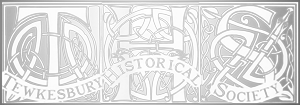

![Captain Price in military<br>uniform (D. Parker)<sup>[10]</sup>](/images/THS02263.jpg)
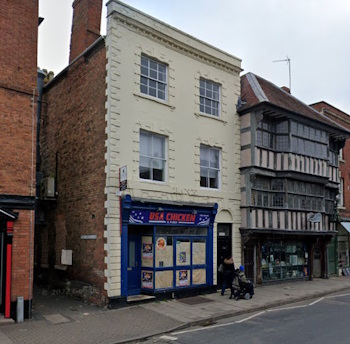
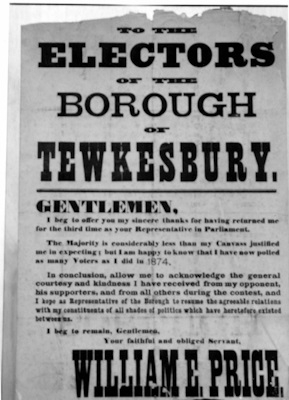
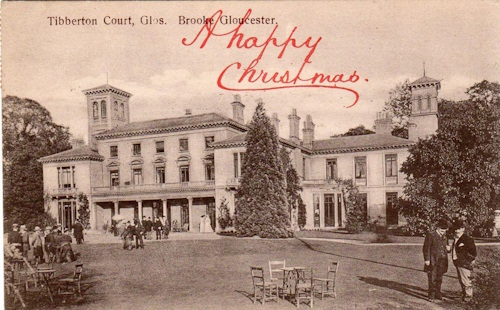
Comments